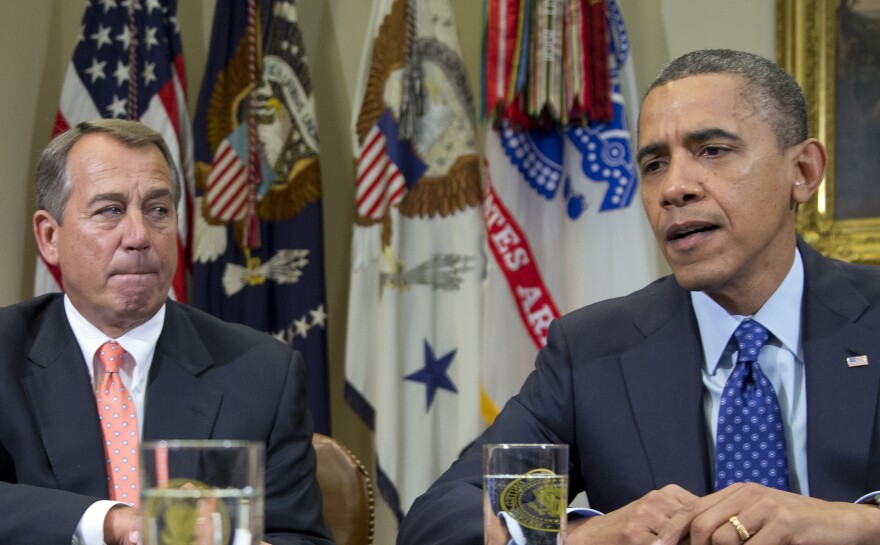The last thing Washington policymakers need is another obstacle to reaching agreements in the next two months on mandatory spending cuts and raising the nation's debt limit.
But the start of the new 113th Congressbrought word that House Speaker John Boehner had sworn off future one-on-one negotiations with President Obama.
The vow to fellow Republicans came just days before Boehner faced re-election to the speakership, for which he needed to minimize GOP opposition. But taking Boehner at his word, some observers think the nation's capital could reach a new level of dysfunction.
"You know, we avoided the fiscal cliff but we left it in a way that leaves the town even more paralyzed," says Vin Weber, a former Republican congressman and one of Washington's top lobbyists. "If it was possible for Republicans and Democrats to be even more at odds with each other — or for the Republican Congress to be more at odds with the president than they were the last couple of years — that's happened."
Weber, a partner at Mercury/Clark & Weinstock, adds: "It worries everybody I've talked to a great deal about how we're going to meet some of these problems going forward. ... For the first time, I've thought it's possible we might actually go into default."
A Strained Relationship
Masters of ambiguity that they were, the framers of the Constitution didn't exactly spell out all the responsibilities of the speaker of the House. But in practice, one of those duties has been engaging in one-on-one negotiations with a president on important policy issues.
Matthew Green, a Catholic University scholar who studied speakers closely and has written a book about them, said he has never heard of a modern-day speaker refusing to participate in such talks.
"I certainly raised my eyebrows when I heard about it," Green said. "It's very unusual. I honestly can't think of a speaker in recent memory who ever made that kind of a pledge."
Granted, Boehner's stance against future negotiations with the president doesn't come out of nowhere.
On at least two occasions now — the summer 2011 debt-ceiling negotiations and the recent fiscal-cliff discussions — Boehner has held talks with Obama only to come away empty-handed and reportedly feeling that the president wasn't negotiating in good faith.
Not only that. All he's had to show for his trouble is the anger of many of his House Republican colleagues and outside conservatives who view such negotiations with the Democratic president as compromising their principles.
The 'Regular Order'
So from a Republican perspective, it makes a certain degree of partisan sense that the speaker would rather skip the gridlock of White House negotiations entirely and proceed directly to the gridlock of what's known as the "regular order": The GOP-run House passes legislation with little to no Democratic support that then gets ignored or voted down by the Democratic-controlled Senate.
One way of looking at what's happened regularly is that Boehner's negotiations with Obama have just delayed the inevitable congressional standoff as talks freeze discussions on Capitol Hill.
"Regular order has been hamstrung by these negotiations with the president. People have just been like waiting for Godot," said John Feehery, who was a top aide to former Republican Speaker Dennis Hastert and now is president of Quinn Gillespie Communications. "They wait and wait and wait and, all of a sudden, they can't get anything done through the regular order.
"I think part of this is setting expectations," Feehery continued. "If you traipse down to the White House ... the expectation is you're going to come up with a deal. If you refuse to traipse down to the White House, and say, 'Pass our bill or pass your own bill and let's get going on it,' that's another set of expectations. Boehner can't be criticized if he goes through the regular order."
Of course, just because you say you won't negotiate doesn't mean you're not up for a chat. If the president requests that the speaker come down to the other end of Pennsylvania Avenue to discuss a few important matters, Boehner would be up for that, says his spokesman, Michael Steel.
"The speaker is always willing to talk to the president, but we're going to address these challenges through the legislative process," he said. Leaving open the possibility of discussions between Obama and Boehner obviously leaves the door open for negotiations between the two men that aren't exactly identified as such.
'Somebody Else Is Cutting The Deals'
Still, Green, the expert on the speakership, saw Boehner's pronouncement as potentially counterproductive:
"If by making that commitment, Boehner meant that he would consult more closely with his colleagues in the House before agreeing to any deal with the White House, it makes some degree of sense. Even speakers as powerful as Nancy Pelosi and Newt Gingrich have sometimes been pushed back by their rank-and-file members for making deals they didn't care for. But to refuse any negotiations with the White House means keeping the House out of the policymaking process altogether. Republicans would be cutting off their nose to spite their face."
Another reaction along those lines came from former Speaker Hastert during a Fox News Radio interview Thursday. He criticized Boehner.
"When you say that, you isolate yourself," Hastert said. "If you're not doing it, who is? And that's a problem. Because if you're not doing it, somebody else is cutting the deals."
Somebody else, like Vice President Biden and Senate Minority Leader Mitch McConnell, a Kentucky Republican, who worked out the fiscal cliff deal the House passed on New Year's Day.
Copyright 2021 NPR. To see more, visit https://www.npr.org.









